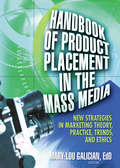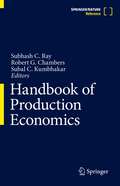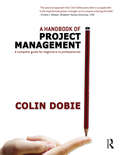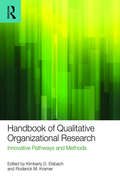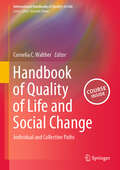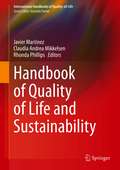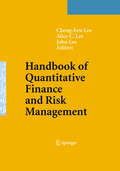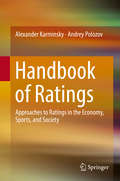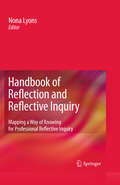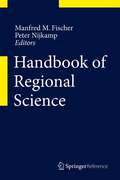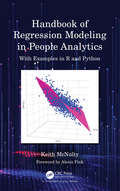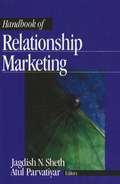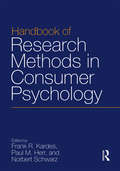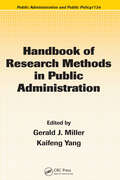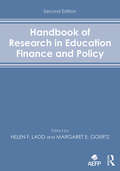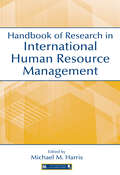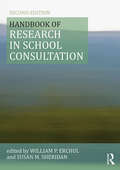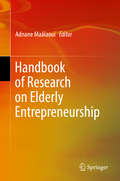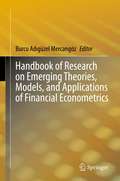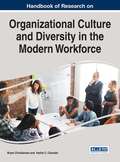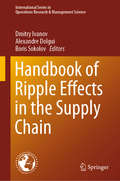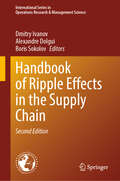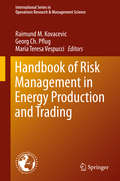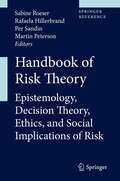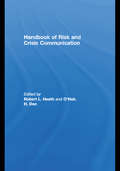- Table View
- List View
Handbook of Product Placement in the Mass Media: New Strategies in Marketing Theory, Practice, Trends, and Ethics
by Mary-Lou GalicianLeading experts present cutting-edge ideas and current research on product placement! The Handbook of Product Placement in the Mass Media: New Strategies in Marketing Theory, Practice, Trends, and Ethics is the first serious book in English to examine the wider contexts and varied texts of product placement, related media marketing strateg
Handbook of Production Economics
by Subal C. Kumbhakar Subhash C. Ray Robert G. ChambersThis three-volume handbook includes state-of-the-art surveys in different areas of neoclassical production economics. Volumes 1 and 2 cover theoretical and methodological issues only. Volume 3 includes surveys of empirical applications in different areas like manufacturing, agriculture, banking, energy and environment, and so forth.
Handbook of Project Management: A complete guide for beginners to professionals
by Colin DobieThe practical approach that Colin Dobie prescribes is as applicable to the experienced project manager as it is anyone entering the field.'Ernest J. Nielsen, Brigham Young University, USA A no-nonsense approach to project management. Essential reading for all project managers and project team members.'Peter Dechaineux, Inaugural Chairman, Australian Institute of Project Management, Australia Excellent coverage of all the material required in easy to follow steps. It places activities in logical context. Essential reading for China's many project managers.' Professor Yuan, Chairman, Asia-Pacific Federation of Project Management.' Colin Dobie has very comprehensively detailed out the intricacies needed to manage projects. Well done.'Adesh Jain, President, PM Guru Inc. and President, IPMAWhether you are creating a new product or building a power station, you need to know how to manage the myriad elements in a project to ensure it is completed on time, on budget and to a high standard. A Handbook of Project Management is a practical and comprehensive guide for project managers working on small and large projects in any field.Colin Dobie systematically maps the four phases in the project lifecycle: initiation, planning, implementation and finalisation. He outlines the processes and techniques of the nine functions of project management, and how they are applied during the project lifecycle. He also explains what a project manager is expected to deliver, and the roles of team leaders and team members. Drawing on international standards and bodies of knowledge, as well as Colin Dobie's extensive industry and training experience in several countries, A Handbook of Project Management is an indispensable guide for anyone who wants to develop their skills in project management. It is extensively illustrated with examples, templates, exercises and checklists, making it valuable resource for experienced project managers.
Handbook of Qualitative Organizational Research: Innovative Pathways and Methods
by Roderick M. Kramer Kimberly D. ElsbachThis handbook provides a comprehensive overview of state-of-the-art, innovative approaches to qualitative research for organizational scholars. Individual chapters in each area are written by experts in a variety of fields, who have contributed some of the most innovative studies themselves in recent years. An indispensable reference guide to anyone conducting high-impact organizational research, this handbook includes innovative approaches to research problems, data collection, data analysis and interpretation, and application of research findings. The book will be of interest to scholars and graduate students in a wide variety of disciplines, including anthropology, organizational behavior, organizational theory, social psychology, and sociology
Handbook of Quality of Life and Social Change: Individual and Collective Paths (International Handbooks of Quality-of-Life)
by Cornelia C. WaltherThis handbook provides an extensive overview of the links between quality of life and social change as pursued in not only humanitarian and development work, but also in the private sector and academia. It combines theoretical and practice-focused chapters and addresses socio-economic, environmental, and political/governance aspects as well as communication and human behavioural factors that favour or hamper social change dynamics. The handbook showcases vast diversity both in the authorship—which includes practitioners from a wide range of sectors and academics from various disciplines—as well in geographical contexts and regions. The chapters cover a wide range methods and tools, which facilitate an inclusive understanding of the relationship between quality of life and social change. They show connections between micro (individual) changes and the dynamics that derive from them at the meso (community), macro (country) and meta levels (planet) of quality of life, and the social change processes sustained through time. The chapters demonstrate that quality of life and social change mutually condition and nurture each other. The handbook overall provides a holistic perspective to social change processes that includes both material and non-material aspects relating to quality of life. This comprehensive and one-of-a-kind volume is of interest to a wide readership, from students and researchers of social development, quality of life and wellbeing research, to development workers, policy makers and other government officials. The handbook is bundled with an interactive online course.
Handbook of Quality of Life and Sustainability (International Handbooks of Quality-of-Life)
by Rhonda Phillips Javier Martinez Claudia Andrea MikkelsenThis handbook provides the latest research related to quality of life and sustainability, taking into account social, economic, environmental, and political/governance aspects as well as specific socio-spatial contexts. The volume includes contributions from established and upcoming scholars from various disciplines and geographical contexts (Global South and North). The varying cultural and socio-spatial contexts of the authors in the selected cases contribute to first-hand knowledge on the realities of sustainability issues affecting the quality of life. The authors apply a wide diversity of methods and tools, which facilitates a unique understanding of the interlinkages between quality of life and sustainability. The chapters are grouped in three main sections: concepts and foundations; tools, techniques, and applications; and innovations. The authors provide their own view and theoretical approximation of the dimensions of sustainability, in particular on how these dimensions play out in relation to quality of life. The combination of sustainability and quality of life concepts and perspectives is particularly important in unravelling the multi-faceted nature of human, urban, rural/spatial development.
Handbook of Quantitative Finance and Risk Management
by John Lee Cheng-Few LeeQuantitative finance is a combination of economics, accounting, statistics, econometrics, mathematics, stochastic process, and computer science and technology. Increasingly, the tools of financial analysis are being applied to assess, monitor, and mitigate risk, especially in the context of globalization, market volatility, and economic crisis. This two-volume handbook, comprised of over 100 chapters, is the most comprehensive resource in the field to date, integrating the most current theory, methodology, policy, and practical applications. Showcasing contributions from an international array of experts, the Handbook of Quantitative Finance and Risk Management is unparalleled in the breadth and depth of its coverage. Volume 1 presents an overview of quantitative finance and risk management research, covering the essential theories, policies, and empirical methodologies used in the field. Chapters provide in-depth discussion of portfolio theory and investment analysis. Volume 2 covers options and option pricing theory and risk management. Volume 3 presents a wide variety of models and analytical tools. Throughout, the handbook offers illustrative case examples, worked equations, and extensive references; additional features include chapter abstracts, keywords, and author and subject indices. From "arbitrage" to "yield spreads," the Handbook of Quantitative Finance and Risk Management will serve as an essential resource for academics, educators, students, policymakers, and practitioners.
Handbook of Ratings
by Alexander Karminsky Andrey PolozovThis handbook presents a systematic overview of approaches to, diversity, and problems involved in interdisciplinary rating methodologies. Historically, the purpose of ratings is to achieve information transparency regarding a given body's activities, whether in the field of finance, banking, or sports for example. This book focuses on commonly used rating methods in three important fields: finance, sports, and the social sector. In the world of finance, investment decisions are largely shaped by how positively or negatively economies or financial instruments are rated. Ratings have thus become a basis of trust for investors. Similarly, sports evaluation and funding are largely based on core ratings. From local communities to groups of nations, public investment and funding are also dependent on how these bodies are continuously rated against expected performance targets. As such, ratings need to reflect the consensus of all stakeholders on selected aspects of the work and how to evaluate their success. The public should also have the opportunity to participate in this process. The authors examine current rating approaches from a variety of proposals that are closest to the public consensus, analyzing the rating models and summarizing the methods of their construction. This handbook offers a valuable reference guide for managers, analysts, economists, business informatics specialists, and researchers alike.
Handbook of Reflection and Reflective Inquiry
by Nona LyonsPhilosophers have warned of the perils of a life spent without reflection, but what constitutes reflective inquiry - and why it's necessary in our lives - can be an elusive concept. Synthesizing ideas from minds as diverse as John Dewey and Paulo Freire, theHandbook of Reflection and Reflective Inquiry presents reflective thought in its most vital aspects, not as a fanciful or nostalgic exercise, but as a powerful means of seeing familiar events anew, encouraging critical thinking and crucial insight, teaching and learning. In its opening pages, two seasoned educators, Maxine Greene and Lee Shulman, discuss reflective inquiry as a form of active attention (Thoreau's "wide-awakeness"), an act of consciousness, and a process by which people can understand themselves, their work (particularly in the form of life projects), and others. Building on this foundation, the Handbook analyzes through the work of 40 internationally oriented authors: - Definitional issues concerning reflection, what it is and is not; - Worldwide social and moral conditions contributing to the growing interest in reflective inquiry in professional education; - Reflection as promoted across professional educational domains, including K-12 education, teacher education, occupational therapy, and the law; - Methods of facilitating and scaffolding reflective engagement; - Current pedagogical and research practices in reflection; - Approaches to assessing reflective inquiry. Educators across the professions as well as adult educators, counselors and psychologists, and curriculum developers concerned with adult learning will find the Handbook of Reflection and Reflective Inquiry an invaluable teaching tool for challenging times.
Handbook of Regional Science
by Peter Nijkamp Manfred M. FischerThe Handbook of Regional Science is a multi-volume reference work providing a state-of-the-art knowledge on regional science composed by renowned scientists in the field. The Handbook is intended to serve the academic needs of graduate students, and junior and senior scientists in regional science and related fields, with an interest in studying local and regional socio-economic issues. The multi-volume handbook seeks to cover the field of regional science comprehensively, including areas such as regional housing and labor markets, regional economic growth, innovation and regional economic development, new and evolutionary economic geography, location and interaction, the environment and natural resources, spatial analysis and geo-computation as well as spatial statistics and econometrics.
Handbook of Regression Modeling in People Analytics: With Examples in R and Python
by Keith McNultyDespite the recent rapid growth in machine learning and predictive analytics, many of the statistical questions that are faced by researchers and practitioners still involve explaining why something is happening. Regression analysis is the best ‘swiss army knife’ we have for answering these kinds of questions. This book is a learning resource on inferential statistics and regression analysis. It teaches how to do a wide range of statistical analyses in both R and in Python, ranging from simple hypothesis testing to advanced multivariate modelling. Although it is primarily focused on examples related to the analysis of people and talent, the methods easily transfer to any discipline. The book hits a ‘sweet spot’ where there is just enough mathematical theory to support a strong understanding of the methods, but with a step-by-step guide and easily reproducible examples and code, so that the methods can be put into practice immediately. This makes the book accessible to a wide readership, from public and private sector analysts and practitioners to students and researchers. Key Features:• 16 accompanying datasets across a wide range of contexts (e.g. academic, corporate, sports, marketing) • Clear step-by-step instructions on executing the analyses. • Clear guidance on how to interpret results. • Primary instruction in R but added sections for Python coders. • Discussion exercises and data exercises for each of the main chapters.• Final chapter of practice material and datasets ideal for class homework or project work.
Handbook of Relationship Marketing
by Jagdish N. Sheth Dr Atul ParvatiyarAs businesses increasingly stress the importance of cooperation and collaboration with suppliers and customers, relationship marketing is emerging as the `core' of all marketing activity. In recent years, there has been an explosive growth in business and academic interest in relationship marketing, yet no comprehensive book has been available to present key concepts, theories, and applications. The editors of this volume have assembled an authoritative and global cast of chapter contributors and crafted a volume that will become the seminal, founding work in this growing field. Their approach is eclectic, including a broad coverage of topics, diverse theoretical and conceptual paradigms, and global viewpoints.
Handbook of Research Methods in Consumer Psychology
by Norbert Schwarz Frank R. Kardes Paul P. HerrWhat impact can various research methods have on consumer psychology? How can they help us understand the workings of the consumer mind? And how can the field of consumer psychology best utilize these methods? In the Handbook of Research Methods in Consumer Psychology, leading consumer psychologists summarize key aspects of the research process and explain how different methods enrich understanding of how consumers process information to form judgments and opinions and to make consumption-related decisions. Kardes, Herr, and Schwarz provide an in-depth analysis of the scientific research methods needed to understand consumption-related judgments and decisions. The book is split into five parts, demonstrating the breadth of the volume: classic approaches, contemporary approaches, online research methods, data analysis, and philosophy of science. A variety of leading researchers give insight into a wide range of topics, reflecting both long-standing debate and more recent developments in the field to encourage discussion and the advancement of consumer research. The Handbook of Research Methods in Consumer Psychology is essential reading for researchers, students, and professionals interested in consumer psychology and behavior.
Handbook of Research Methods in Public Administration (Public Administration and Public Policy)
by Sondra Brandler Camille P. RomanDescribing new techniques and novel applications, Handbook of Research Methods in Public Administration, Second Edition demonstrates the use of tools designed to meet the increased complexity of problems in government and non-profit organizations with ever-more rigorous and systematic research. It presents detailed information on conceptuali
Handbook of Research in Education Finance and Policy
by Helen F. Ladd Margaret E. GoertzSponsored by the Association for Education Finance and Policy (AEFP), the second edition of this groundbreaking handbook assembles in one place the existing research-based knowledge in education finance and policy, with particular attention to elementary and secondary education. Chapters from the first edition have been fully updated and revised to reflect current developments, new policies, and recent research. With new chapters on teacher evaluation, alternatives to traditional public schooling, and cost-benefit analysis, this volume provides a readily available current resource for anyone involved in education finance and policy. The Handbook of Research in Education Finance and Policy traces the evolution of the field from its initial focus on school inputs and revenue sources used to finance these inputs, to a focus on educational outcomes and the larger policies used to achieve them. Chapters show how decision making in school finance inevitably interacts with decisions about governance, accountability, equity, privatization, and other areas of education policy. Because a full understanding of important contemporary issues requires inputs from a variety of perspectives, the Handbook draws on contributors from a number of disciplines. Although many of the chapters cover complex, state-of-the-art empirical research, the authors explain key concepts in language that non-specialists can understand. This comprehensive, balanced, and accessible resource provides a wealth of factual information, data, and wisdom to help educators improve the quality of education in the United States.
Handbook of Research in International Human Resource Management (Organization And Management Ser.)
by Michael M. HarrisHandbook of Research in International Human Resource Management, a book in LEA‘s Organization and Management Series, provides a sophisticated, in-depth examination of research in international human resource management (IHRM). Editor Michael M. Harris compiles research in IHRM that is otherwise fragmented across numerous journals and conducted from
Handbook of Research in School Consultation (Consultation, Supervision, and Professional Learning in School Psychology Series)
by Susan M. Sheridan William P. ErchulNow in its second edition, the Handbook of Research in School Consultation provides the field of school-based consultation with a comprehensive volume examining research perspectives and methodologies, models of practice, and future research directions. Revised and updated, this collection brings together leading experts in the field, offering both producers and consumers of school consultation an invaluable snapshot of the current boundaries and rapidly growing content of the discipline. It touches upon not only the scientific progress of the field, but also upon the variety of cutting-edge techniques and approaches currently being developed with an eye toward a changing world. Perfect for school psychologists, and also appropriate for researchers, trainers, and school-based professionals such as special educators and school counselors, this handbook is an absolute necessity for those keeping pace with the innovating, evolving world of school consultation.
Handbook of Research on Elderly Entrepreneurship
by Adnane MaâlaouiThis handbook introduces readers to the concept of elderly entrepreneurship, and analyzes key issues concerning individuals and institutions. In addition, it presents theoretical and empirical studies exploring the reasons why elderly persons choose to pursue entrepreneurship, despite their advanced age. To investigate this comparatively new entrepreneurial phenomenon, the contributors address psychological, sociological and gerontological aspects, and share unique interdisciplinary insights. The book’s chapters are methodologically diverse, and the scale of analysis ranges from individual cases to country-level patterns. At a time when the world’s major economies are facing a demographic challenge due to ageing populations, elderly entrepreneurship may provide new economic opportunities and motivate more inclusive policymaking.
Handbook of Research on Emerging Theories, Models, and Applications of Financial Econometrics
by Burcu Adıgüzel MercangözThis handbook presents emerging research exploring the theoretical and practical aspects of econometric techniques for the financial sector and their applications in economics. By doing so, it offers invaluable tools for predicting and weighing the risks of multiple investments by incorporating data analysis. Throughout the book the authors address a broad range of topics such as predictive analysis, monetary policy, economic growth, systemic risk and investment behavior. This book is a must-read for researchers, scholars and practitioners in the field of economics who are interested in a better understanding of current research on the application of econometric methods to financial sector data.
Handbook of Research on Organizational Culture and Diversity in the Modern Workforce
by Bryan Christiansen Harish C. ChandanIn today's globalized economy, an understanding of organizational culture and diversity in the modern workforce is crucial to increasing corporate productivity and profit. This publication provides useful reference material for business and government executives, researchers, and undergraduate/graduate students for guidance in the areas of human resource management, occupational health, and well-being at work including work-life balance and firm performance. <p><p> Insights into relative perspectives in culture theories such as the Gothberg IV Model and Hofstede's Model are presented in cross-cultural industrial settings. Qualitative methods in organizational and industrial psychology research are discussed. The latest research on sexual harassment in digital environments, managerial bullying, incivility at work and organizational diversity including inclusion of people with disabilities is presented. <p> Recent research on work-related micro organizational behavior human factors, cynical individual factor, employee empowerment and organizational cynicism, and organizational justice is presented. Leadership traits and active listening and emotional intelligence at work are discussed. Business and industrial organizations can use these articles for guidance in the areas of talent retention and development and international assignments.
Handbook of Ripple Effects in the Supply Chain (International Series in Operations Research & Management Science #276)
by Dmitry Ivanov Alexandre Dolgui Boris SokolovThis book offers an introduction to the ripple effect in the supply chain for a broad audience comprising recent developments. The chapters of this handbook are written by leading experts in supply chain risk management and resilience. For the first time, the chapters present in their synergy a multiple-faceted view of the ripple effect in supply chains, while considering organization, optimization, and informatics perspectives. Ripple effect describes the impact of a disruption propagation on supply chain performance, structural designs and operational parameters. The ripple effect manifests when the impact of a disruption cannot be localized and cascades along the supply chain. The resulting structural dynamics can lead to capacity and demand fulfilment downscaling and negatively influence the firm’s financial and operational performance. The book delineates major features of the ripple effect and methodologies to mitigate the adverse impact of supply chain disruption propagation and to recover in case of severe disruptions. The book provides fresh insights for supply chain management and engineering regarding the following questions: - In what circumstance does one failure cause other failures? - Which structures of the supply chain are especially susceptible to the ripple effect? - What are the typical ripple effect scenarios and what are the most efficient ways to respond them? Distinctive Features: • It considers ripple effect in the supply chain from an multi-disciplinary perspective• It offers an introduction to ripple effect mitigation and recovery policies in the framework of disruption risk management in supply chains for a broad audience• It integrates management and engineering perspectives on disruption risk management in the supply chain• It presents innovative optimization and simulation models for real-life management problems• It considers examples from both industrial and service supply chains• It reveals decision-making recommendations for tackling disruption risks in the supply chain in proactive and reactive domains.
Handbook of Ripple Effects in the Supply Chain (International Series in Operations Research & Management Science #276)
by Dmitry Ivanov Alexandre Dolgui Boris SokolovThis book highlights the major features of the ripple effect and introduces methodologies to mitigate its adverse impact on supply chain resilience and to recover from severe disruptions. It brings fresh insights into the fields of supply chain management and engineering, addressing three fundamental questions: &“In what circumstance does one failure trigger others?&” &“Which supply chain structures are especially susceptible to the ripple effect?&” &“What are the typical ripple effect scenarios and the most efficient ways to respond to them?&” In this new edition, recent advancements are incorporated, particularly in areas such as supply chain viability, digital supply chains, artificial intelligence, and epidemiological models. Furthermore, it introduces new methodologies with a particular emphasis on data-driven and AI-based approaches. This comprehensive book provides innovative optimization and simulation models to address real-world challenges. With examples from industrial and service sectors, it offers actionable decision-making recommendations for tackling disruption risks in the supply chain proactively and reactively. As such the book is a comprehensive source for diverse readerships.
Handbook of Risk Management in Energy Production and Trading
by Georg Ch. Pflug Raimund M. Kovacevic Maria Teresa VespucciThis book presents an overview of the risks involved in modern electricity production, delivery and trading, including technical risk in production, transportation and delivery, operational risk for the system operators, market risks for traders, and political and other long term risks in strategic management. Using decision making under uncertainty as a methodological background, the book is divided into four parts, with Part I focusing on energy markets, particularly electricity markets. Topics include a nontechnical overview of energy markets and their main properties, basic price models for energy commodity prices, and modeling approaches for electricity price processes. Part II looks at optimal decisions in managing energy systems, including hydropower dispatch models, cutting plane algorithms and approximative dynamic programming; hydro-thermal production; renewable; stochastic investments and operational optimization models for natural gas transport; decision making in operating electricity networks; and investment in extending energy production systems. Part III explores pricing, including electricity swing options and the pricing of derivatives with volume control. Part IV looks at long-term and political risks, including energy systems under aspects of climate change, and catastrophic operational risks, particularly risks from terrorist attacks.
Handbook of Risk Theory
by Martin Peterson Sabine Roeser Per Sandin Rafaela HillerbrandRisk has become one of the main topics in fields as diverse as engineering, medicine and economics, and it is also studied by social scientists, psychologists and legal scholars. But the topic of risk also leads to more fundamental questions such as: What is risk? What can decision theory contribute to the analysis of risk? What does the human perception of risk mean for society? How should we judge whether a risk is morally acceptable or not? Over the last couple of decades questions like these have attracted interest from philosophers and other scholars into risk theory. This handbook provides for an overview into key topics in a major new field of research. It addresses a wide range of topics, ranging from decision theory, risk perception to ethics and social implications of risk, and it also addresses specific case studies. It aims to promote communication and information among all those who are interested in theoetical issues concerning risk and uncertainty. This handbook brings together internationally leading philosophers and scholars from other disciplines who work on risk theory. The contributions are accessibly written and highly relevant to issues that are studied by risk scholars. We hope that the Handbook of Risk Theory will be a helpful starting point for all risk scholars who are interested in broadening and deepening their current perspectives.
Handbook of Risk and Crisis Communication (Routledge Communication Ser.)
by H. Dan O'Hair Robert L. HeathThe Handbook of Risk and Crisis Communication explores the scope and purpose of risk, and its counterpart, crisis, to facilitate the understanding of these issues from conceptual and strategic perspectives. Recognizing that risk is a central feature of our daily lives, found in relationships, organizations, governments, the environment, and a wide variety of interactions, contributors to this volume explore such questions as: "What is likely to happen, to whom, and with what consequences?"; "To what extent can science and vigilance prevent or mitigate negative outcomes?"; and "What obligation do some segments of local, national, and global populations have to help other segments manage risks?", shedding light on the issues in the quest for definitive answers. The Handbook offers a broad approach to the study of risk and crisis as joint concerns. Chapters explore the reach of crisis and risk communication, define and examine key constructs, and parse the contexts of these vital areas. As a whole, the volume presents a comprehensive array of studies that highlight the standard principles and theories on both topics, serving as the largest effort to date focused on engaging risk communication discussions in a comprehensive manner. With perspectives from psychology, sociology, anthropology, political science, economics, and communication, the Handbook of Risk and Crisis Communication enlarges the approach to defining and recognizing risk and how should it best be managed. It provides vital insights for all disciplines studying risk, including communication, public relations, business, and psychology, and will be required reading for scholars and researchers investigating risk and crisis in various contexts.
